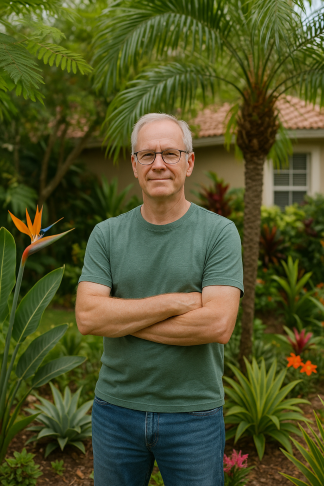Welcome To Healthysport!
The Gradual Shift
- Details
- Written by: Healthysport
- Hits: 599
I used to be super-active. My career as a physical therapist demanded constant movement — standing, walking, lifting, assisting, and talking my brains out while instructing patients. As if that weren’t enough, I trained for long-distance running on an almost daily schedule. Living alone meant I had to handle everything myself: laundry, cooking, shopping, cleaning — and, for reasons that still amaze me, I even returned to night school in my fifties to earn a second degree in Computer and Information Technology.
There are many people like me — or perhaps there were. We were not born into privilege. Every good thing we achieved came from perseverance, discipline, and work. Money? Work every day. Health? Run every other day. Fun? Maybe later. Even relationships had to wait until the next free weekend.
But time has its own way of humbling even the most determined. Just when my body had become accustomed to decades of relentless motion, unwelcome changes crept in — gradual, yet undeniable. Though I expected them, I was still surprised. I tried to resist them — ignored the pains, fought the memory lapses, added more miles to my runs, spent longer hours at the gym, and took on new hobbies as if to outrun the inevitable.
No one wins against nature. Acceptance came slowly, but it came. I used to lift patients from bed to chair single-handedly; later, I needed assistance. I used to run fifteen miles at dawn and work eight hours afterward. I could stay up for three nights straight to meet a programming deadline.
Then I got old.
The decline was not just physical — it was mental and emotional. I spent years being “too nice,” worrying too much about how others saw me — patients, coworkers, supervisors. In health care, you smile through exhaustion, keep calm when insulted, and dodge the occasional swing from a confused patient. You motivate, you restrain, and you do it again tomorrow. Without careful boundaries, the profession can consume you. Burnout becomes inevitable — a short temper, emotional fatigue, coworkers breaking down in tears for no clear reason, the whole department passing around the same cold because everyone’s immune system is running on fumes. For years, I lived under high cortisol and low rest.
Eventually, the body surrendered: knee pain, shoulder pain, back pain. I watched my contemporaries retire one by one, replaced by young, energetic graduates filled with ambition, eager to specialize, to lead, to prove themselves. Suddenly, I was the one reminiscing about “the good old days.” My opinions, once sought after, began to lose weight. Not because others dismissed them, but because I quietly withdrew — preferring peace to confrontation, calm to chaos. There was relief in the sidelines: fewer politics, fewer headaches, fewer sleepless nights.
During rare pauses at work — those fleeting moments when I stared blankly at the wall after charting yet another patient’s progress — I began to dream of retirement. To be free from the constant pressure of pleasing patients, navigating hospital bureaucracy, and racing against time. I longed for mornings without alarms, for days unmeasured by productivity.
And then it happened — I reached the earliest age of eligibility and retired, without hesitation.
The Caveat: When Freedom Becomes Another Race
But here’s the caveat: like a child curious about new things, the initial months of retirement can be as exhausting as a full-time job. Remember the saying — curiosity killed the cat.
The first stage of retirement is often a frenzy of exploration. You want to try everything: gardening, traveling, photography, volunteering, joining clubs, learning instruments, or dabbling in business. I call these early pursuits “temporary passions and obsessions” — as explosive as the Big Bang, and sometimes as implosive as the Big Crunch.
This is a critical time for self-awareness and restraint. Many retirees, fueled by excitement and sudden freedom, invest too much — emotionally, financially, socially — in ventures that later lose meaning or fail altogether.
I’ve seen it happen: people starting businesses with no prior knowledge and losing their savings; others playing the stock market blindly; some buying properties they thought they could flip or rent out, only to end up in debt. Others spend lavishly on travel, dining out, or hobbies that drain their resources faster than expected.
I’m not saying retirees should suppress their dreams. On the contrary — this is the time to enjoy life. But it’s essential to scale your enthusiasm. Prepare before you leap. If you plan to start a business, ensure you’re well-informed and genuinely passionate about it. If you dream of being a woodworker or a cabinetmaker, start dabbling while you’re still strong and curious. Preparation, not impulsivity, is the key to fulfillment in retirement.
Preparation and Planning: The Seeds of Sustainable Joy
It’s all a matter of preparation. If travel excites you, start early. Take weekend trips, try hiking, or learn how to pack smart before venturing into bigger adventures. You don’t want to discover your fear of heights while zip-lining in your seventies.
If you dream of opening a small business — say, an ice cream shop — try working part-time in one while you’re younger. Learn how it operates before investing your retirement fund. The same logic applies to coffee shops, restaurants, or horticulture stores. Passion alone is not enough; practical experience is your compass.
Dreams are easy. Reality, however, can feel like walking barefoot on broken glass. Align your hobbies with your future capabilities. Build skill and experience early, while energy and learning capacity are still on your side.
Knowing Yourself and Scaling Your Joys
And most importantly — know yourself. Know your capacity, your limits, and your true sources of joy.
I’ve practiced gardening on and off through much of my adult life. I even took horticulture courses at a local college — one on Florida native plants, another on basic landscaping (which I discovered wasn’t my strength, but I learned nonetheless). For years, I served on the HOA board of my building, volunteering to maintain its landscape. Through trial and error, I learned the importance of irrigation, monitoring, and patience.
My “plant-on-sale landscaping” philosophy was born from thrift and creativity: I buy whatever’s discounted and try to revive it. My garden is an eclectic mix — a patchwork of species, colors, and textures. Imperfect, but alive.
Still, gardening is not cheap. Plants, soil, pots, garden beds, fertilizers, nets, and water systems add up. I learned to scale down — to keep only what I can manage, physically and financially. Instead of hundreds of plants, I grow a few vegetables, ornamentals, and select trees. I enjoy visiting Home Depot or Lowe’s, not to spend lavishly, but to rescue discounted, near-dead plants and give them a second life.
That’s the essence of it — I love giving life to something new. Watching a seed sprout or a cutting root brings fulfillment no grocery-bought fruit can match. My two-inch jacaranda sapling from Etsy now towers above my roof; the Queen Emma lilies, bird-of-paradise, pine trees, agaves, and dragon plants thrive under my care.
They give me purpose — a reason to wake up, step outside, breathe fresh air, and stay connected to the living rhythm of nature.
The True Reward of Retirement
In the end, retirement is not simply about stopping work. It’s about redefining life on your own terms.
The key lies in balance — between curiosity and contentment, between activity and rest, between doing and simply being. Retirees who thrive are those who plan, pace themselves, and invest in what genuinely sustains them: health, creativity, relationships, spirituality, and peace.
It’s a gradual shift — from striving to savoring, from achievement to appreciation, from proving yourself to simply being yourself.
And that, perhaps, is the real reward of growing older.
Retirement: Disowning, Downsizing, Trimming
- Details
- Written by: Healthysport
- Hits: 698
Cultivating Calm: A Retiree’s Reflection on Gardening, Growth, and Letting Go

This morning, I stepped out into the backyard to check on my vegetables and found a small, unexpected triumph — a single bloom on one of the plants. I tried not to get too sentimental; after all, I’m still a beginner gardener. This isn’t about harvests yet, or self-sufficiency. It’s about learning — how to germinate seedlings, propagate cuttings, manage soil and water. Mostly, it’s about paying attention.
So far, I’m doing all right. None of my plants have died — a small miracle given my history. My moringa’s leaves are yellowing, probably from overwatering, a rookie mistake. Root rot is real. I’m cutting back.
What worries me more than losing plants is losing interest. I have a habit of moving on too quickly — starting one hobby, then chasing another before the first has had a chance to grow. I once likened myself to a businessman who opens a clothing shop, then immediately plans an ice-cream parlor. Enough of that. This time, I’m aiming for something new: not expansion, but consolidation.
The Illusion of Endless Options
Retirement offers a strange sort of freedom. The horizon opens up — travel, cooking, learning new skills, even starting a business. There’s a seductive belief that now, finally, there’s time for everything. But if I’m not careful, I could end up busier than ever — a thousand half-finished projects instead of one full life.
I’ve noticed how easy it is to get swept into distraction. I scroll through reels, buy small gadgets online, and tell myself they’ll fill some gap — a $7 air-conditioner spray here, a kitchen tool there. None of it costs much, but over time it adds up, financially and emotionally.
When I was still working, I didn’t have time for any of this. My days were tightly scheduled — work, rest, repeat. Even when I went back to university in my fifties for an IT degree, I was too busy with coding projects and exams to care about social media. I didn’t even know what Facebook was until years later.
Now, I post nearly every day — often about nothing special. I make short videos, greet people on their birthdays (some of whom I barely know), and spend hours online. It all began three years ago when I started experimenting with video editing, making little reels of my travels to Manila. Soon I was hooked.
I used to feel smug about not using social media — the kind of person who could build an app like Facebook, not use it. But here I am, a willing participant. Still, I draw a line. I won’t post just to feed algorithms. I understand how the system works — data is the fuel of the digital world — but I’d rather not surrender every moment of my life to it. Some things, I keep just for myself.
From Accumulating to Editing
In many ways, my gardening mirrors something larger: the art of letting go. After a lifetime of building — careers, homes, relationships — we reach a point where more no longer feels like progress. Retirement, I’ve realized, isn’t just about having time; it’s about learning what to do with less.
Psychologists call it Socioemotional Selectivity Theory — the idea that as we age and become more aware of time’s limits, we naturally focus on what matters most: emotionally meaningful activities and relationships. Another model, Selective Optimization with Compensation, puts it simply: choose what matters, optimize your energy for it, and adapt to change. In essence, we learn to prune our lives the way we prune plants — gently, deliberately, to let the healthiest branches thrive.
The Power of a Smaller Life
Research supports this shift. Studies show that retirees who downsize from large family homes often experience mixed emotions — nostalgia at first, then relief. Gerontologist Beth Luborsky found that wellbeing improves when new living spaces “fit” a person’s physical and social needs: single-level layouts, nearby friends, manageable costs.
Even clutter affects health. UCLA researchers discovered that messy homes can elevate cortisol levels — the body’s stress hormone. A 2017 Japanese study found that older adults who spent just a few structured hours decluttering reported better sleep and greater calm. It turns out tidying up isn’t only about space — it’s about serenity.

How to Trim Without Regret
Start with your stuff.
Try the “Five Box Method”: Keep, Gift, Donate, Recycle, Sell. Work in 45-minute bursts to avoid decision fatigue. For sentimental things, do a “legacy sort” — choose a dozen objects that tell your story and pass them on now, while you can still share their meaning. What you’re giving isn’t clutter; it’s connection.
Then, the space itself.
That family home with its empty rooms and fading echoes may no longer fit your life. A smaller, single-level home often means less cleaning, lower costs, and fewer hazards. If you prefer to stay put, focus on “rightsizing”: add grab bars, improve lighting, remove trip hazards. Design around how you live now, not how you did 30 years ago.
Next, the social circle.
Friendships, too, benefit from pruning. Research known as the convoy model shows that people age best when they nurture a small, warm network of supportive relationships. Map your circle: who energizes you, and who drains you? Choose depth over breadth.
Don’t forget the digital clutter.
Your online life needs spring-cleaning, too. List your accounts, cancel old subscriptions, delete duplicate photos, and consolidate passwords. Create a “digital legacy” document for loved ones. It’s one of the kindest gifts you can leave behind.
And finally, the finances.
Downsizing isn’t only about space — it’s financial sanity. Compare the costs of staying versus moving. Simplify your accounts, review your will and power of attorney, and ensure your money aligns with your lifestyle, not your past ambitions. Studies show that retirees who plan these transitions early — even on paper — report higher satisfaction and less anxiety later.
The Emotional Work of Letting Go
Of course, this isn’t just practical. Letting go stirs up identity. You’re not only sorting through objects — you’re sorting through yourself. Each decision carries a memory: who you were, who you thought you’d be.
Researchers describe downsizing as a “life review in motion.” The process itself becomes a way of honoring your past before stepping lightly into the future. Take photos of cherished items before donating them. Write small notes — “Our first camping trip, 1984” — before passing them on. Memory can outlive the object.
And remember, minimalism isn’t the goal. The point isn’t to strip life bare, but to make room for what still matters.
What Freedom Feels Like
Those who’ve done the hard work of trimming down often describe a strange, buoyant relief. “I thought I’d feel diminished,” says Margaret, 72, who sold her family home of forty years. “Instead, I feel free. I can breathe again.”
That, perhaps, is the real secret of ageing well: not accumulation, but clarity.
When people talk about “aging gracefully,” they often mean accepting wrinkles or slowing down. But perhaps grace lies in something quieter — the courage to simplify. To disown what no longer fits. To downsize not just homes but expectations.
Retirement isn’t an ending. It’s an edit — the kind that sharpens the story and reveals its strongest lines.
A Simple Start Toward a Lighter Life
-
Set your intention. What do you most want — space, calm, time?
-
Take inventory. List possessions, commitments, and subscriptions.
-
Declutter in short bursts. 45 minutes a day is enough.
-
Compare your housing options. Stay, retrofit, or move.
-
Organise your affairs. Update wills, passwords, and directives.
-
Nurture your core circle. Call the people who truly matter.
Final Reflection
Out in the garden, that single flower I noticed this morning may never bear fruit — and that’s fine. Gardening, like aging, is less about control and more about observation. Things grow, fade, and renew in their own time.
As I water less, trim more, and slow my pace, I see the beauty in subtraction. In this quiet stage of life, the best kind of growth might just come from learning how to let go.
Page 5 of 91
